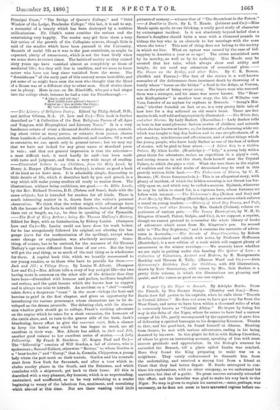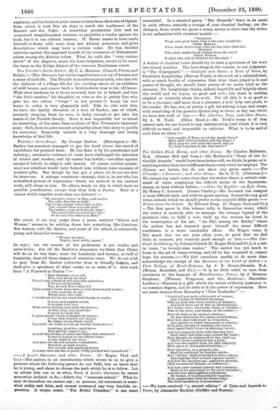A Voyage Up the Niger to Benueh. By Adolphe Burdo.
From the French, by Mrs. George Sturge. (Bentley and Son.)—Mons. Burdo does full justice to his exploits, when be calls them "Travels in Central Africa." He does not seem to have got very far from the West Coast, and never to have been within a thousand miles of what is commonly known as "Central Africa." He began by losing his way in the delta of the Niger, where he seems to huvo had a narrow escape of his life, partly recompensed by the opportunity it gave him of delivering a spirited harangue to his despairing Kroomen. Thanks to that, and his good-luck, he found himself at Akaasa. Starting from thence, he met with various adventures, ending in his being deserted by his crew. In this plight he fell in with Bishop Crowther, of whom he gives an interesting account, speaking of him with most sincere gratitude and appreciation. In the Bishop's steamer he ascended the Benueh, till* a place called Imaha was reached. Here they found the King preparing to make war on a neighbour. They vainly endeavoured to dissuade him from the undertaking, and received a strong hint from a friend at Court that they had better depart. M. Burdo attempted to con- tinue his explorations, with no other company, as we understand his narrative, but that of a guide. No great success naturally attended this effort, and the traveller was glad to make his way back to the Niger. No map is given to explain his narrative,—none, perhaps, was necessary, as he does not seem to have traversed regions before un-
explored ; and his farthest point seems to have been the town of Ogbeir, from which it took him six days to reach the confluence of the Benueh and the Niger. A somewhat pretentious title and an occasional magniloquence combine to prejudice a reader against the book, but it is not without interest. M. Burdo seems to have made himself at home with more than one African potentate, and gives descriptions which may have a certain value. He has decided opinions against the supposed benefit of the extension of Mahommed- anism among the African tribes. What be calls the "very carious creed" of the Akpotes, about the Last Judgment, seems to be much the same as the Bridge Alsirat Of the common Mussluman creed.



































 Previous page
Previous page